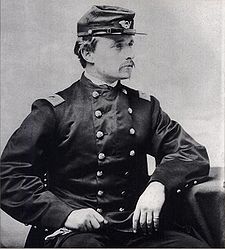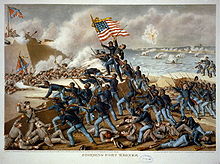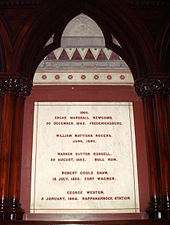- Robert Gould Shaw
-
This article is about the American Civil War Colonel. For his first cousin, the Massachusetts landowner, see Robert Gould Shaw II. For other persons with a similar name, see Robert Shaw.
Robert Gould Shaw 
Colonel Robert Gould Shaw, Volunteer Army of the United States in May, 1863Born October 10, 1837
Boston, MassachusettsDied July 18, 1863 (aged 25)
Morris Island, South CarolinaAllegiance United States of America Years of service 1861–1863 Rank  Colonel
ColonelUnit 7th New York Volunteer Infantry Regiment
2nd Regiment Massachusetts Volunteer InfantryCommands held 54th Massachusetts Volunteer Infantry Battles/wars - Battle of Antietam
- Battle of Grimball's Landing
- Second Battle of Fort Wagner
Robert Gould Shaw (October 10, 1837 – July 18, 1863) was an American officer in the Union Army during the American Civil War. As colonel, he commanded the all-black 54th Regiment, which entered the war in 1863. He was killed in the Second Battle of Fort Wagner, near Charleston, South Carolina.[citation needed]
He is the principal subject of the 1989 film Glory, where he is portrayed by Matthew Broderick.
Contents
Early life and career
Shaw was born in Boston to a prominent abolitionist family. His parents were Francis George and Sarah Blake Sturgis Shaw. The family lived off an inheritance left by Shaw's merchant grandfather, also named Robert Gould Shaw (1776 – 1853). Shaw had four sisters: Anna, Josephine, Susannah and Ellen.[citation needed]
He moved with his family to a large estate in West Roxbury, adjacent to Brook Farm when he was five. In his teens, Shaw spent some years studying and traveling in Switzerland, Italy, Hanover, Norway, and Sweden. His family moved to Staten Island, New York, settling there among a community of literati and abolitionists, while Shaw attended the lower division of St. John's College, the equivalent of high school in the institution that became Fordham University. From 1856 until 1859, Shaw attended Harvard University, where he was a member of the Porcellian Club, but he withdrew before graduating.[citation needed] He was a member by primogeniture of the Society of the Cincinnati.[1]
Civil war
After Abraham Lincoln's election and the secession of several Southern states, Shaw joined the 7th New York Infantry Regiment and marched with it to the defense of Washington, D.C., in April 1861. The unit served only 30 days. In May 1861, Shaw joined the 2nd Massachusetts Infantry as second lieutenant. Shaw took part in the battles of Winchester, Cedar Mountain, and Antietam while with the 2nd Massachusetts Infantry.[citation needed]
Shaw was approached by his father while in camp in late 1862 to take command of a new All-Black Regiment. At first he declined the offer, but after careful thought he accepted the position. Shaw's letters clearly state that he was dubious about a free black unit succeeding, but the dedication of his men deeply impressed him, and he grew to respect them as fine soldiers. On learning that black soldiers would receive less pay than white ones, he inspired his unit to conduct a boycott until this inequality was rectified. The enlisted men of the 54th Massachusetts Infantry (and the sister 55th) refused pay until Congress granted them full back pay at the white pay rate in August 1864.[citation needed]
Shaw was promoted to major on March 31, 1863, and to colonel on April 17.[citation needed]
Marriage
On May 2, 1863, Shaw married Annie Kneeland Haggerty (1835–1907) in New York City. They decided to marry before the unit left Boston despite their parents' misgivings. They spent their brief honeymoon at the Haggerty farm in Lenox, Massachusetts.[citation needed]
But he later was noted to have a 'deep friendship' with Miss Charlotte Forten, an African American school teacher when his troops were stationed in South Carolina. Miss Forten speaks highly of the colonel in her diary, but Shaw did not mention her existence in any of his letters to Annie.[citation needed]
Letters
Robert Shaw is well-known for the over 200 letters he wrote to his family and friends during the Civil War.[citation needed] They are currently located in the Houghton Library at Harvard University. Digital facsimiles of this collection are publicly available. The book, Blue-Eyed Child of Fortune, includes most of his letters and a brief biography of Shaw. Peter Burchard also used these letters as the basis for his book One Gallant Rush, which is one of the books upon which the film Glory was based.[citation needed]
Death at Battery Wagner
 The Storming of Fort Wagner
The Storming of Fort Wagner
The 54th Regiment was sent to Charleston, South Carolina, to take part in the operations against the Confederates stationed there. On July 18, 1863, along with two brigades of white troops, the 54th assaulted Confederate Battery Wagner. As the unit hesitated in the face of fierce Confederate fire, Shaw led his men into battle by shouting, "Forward, Fifty-Fourth Forward!" He mounted a parapet and urged his men forward, but was shot through the heart and he died almost instantly. According to the color Sgt of the 54th Mass, he was shot and killed trying to lead the unit forward and fell on the outside of the fort.[citation needed]
The victorious Confederates buried him in a mass grave with many of his men, an act they intended as an insult.[2] Following the battle, commanding Confederate General Johnson Hagood returned the bodies of the other Union officers who had died, but left Shaw's where it was. Hagood informed a captured Union surgeon that "had he been in command of white troops, I should have given him an honorable burial; as it is, I shall bury him in the common trench with the negroes that fell with him."[3] Although efforts were made to recover Shaw's body (which had been stripped and robbed prior to burial), Shaw's father publicly proclaimed that he was proud to know that his son was interred with his troops, befitting his role as a soldier and a crusader for social justice.[4] In a letter to the regimental surgeon, Lincoln Stone, Frank Shaw wrote:
"We would not have his body removed from where it lies surrounded by his brave and devoted soldiers....We can imagine no holier place than that in which he lies, among his brave and devoted followers, nor wish for him better company. – what a body-guard he has!"[5]
After Robert Shaw's death, his young wife, Annie, moved to Europe to live with her sister. She never remarried.[citation needed]
Memorials
 Shaw memorial at Mount Auburn Cemetery
Shaw memorial at Mount Auburn Cemetery
- In 1864, sculptor Edmonia Lewis created a bust of Shaw.
- The Robert Gould Shaw Memorial, designed by Augustus Saint-Gaudens and Stanford White, was built in his memory on Beacon and Park streets in Boston in 1897.
"There they march, warm-blooded champions of a better day for man. There on horseback among them, in his very habit as he lived, sits the blue-eyed child of fortune, upon whose happy youth every divinity had smiled." — Oration by William James at the exercises in the Boston Music Hall, May 31, 1897, upon the unveiling of the Shaw Monument.[1]
- Some drawings and plaster mock-ups also exist.[6] There is an additional casting of the Shaw Memorial now on display at the National Gallery of Art in Washington, D.C.
- A monument to Shaw's memory was erected by his family in the plot at Moravian Cemetery in Staten Island, New York. An annual commemoration is held there on his birthday.
- Shaw was memorialized in the transept of Harvard University's Memorial Hall, which is dedicated to the students who perished in the American Civil War. Although he did not graduate, he is credited with the class of 1860.
- Elizabeth Gaskell was inspired by the life of Robert Gould Shaw to compose a text and poem in his honor, "Robert Gould Shaw", which appeared in Macmillan's Magazine (1864) and is available on The Gaskell Web.
- The story of Shaw and the 54th Massachusetts was dramatized in the 1989 film Glory, with Shaw portrayed by Matthew Broderick.
- Shaw, the 54th regiment, and Augustus Saint-Gaudens' memorial are the subject of Charles Ives's piece Three Places in New England.
- The New England poet Robert Lowell referenced both Shaw and the Shaw Memorial in the poem "For The Union Dead".
- African-American poet Paul Laurence Dunbar wrote a poem entitled "Robert Gould Shaw", in which he states: "Since thou and those who with thee died for right/Have died, the Present teaches, but in vain!"[7]
- African-American poet Benjamin Griffith Brawley wrote a memorial poem entitled "My Hero"[8] in praise of Robert Gould Shaw.
- The neighborhood of Shaw, Washington, DC, which grew out of freed slave encampments, bears his name.
Gallery
See also
Notes
- ^ a b Boston City Council (1897). Exercises at the dedication of the monument to Colonel Robert Gould Shaw and the Fifty-fourth regiment of the Massachusetts infantry (May 31, 1897). Boston: Municipal Printing Office. http://www.archive.org/stream/exercisesatdedic00bosto#page/n7/mode/2up.
- ^ Henry Cabot Lodge. Hero Tales from American History. p. 109. http://manybooks.net/pages/lodgeh18641864/109.html.
- ^ Foote 2003, p. 119
- ^ Buescher, John. "Robert Gould Shaw." Teachinghistory.org. Accessed 12 July 2011.
- ^ Foote 2003, p. 120
- ^ National Gallery of Art (2011). "Augustus Saint-Gaudens". Artist. Washington, DC: National Gallery of Art. http://www.nga.gov/cgi-bin/tsearch?artistid=2262.
- ^ Paul Laurence Dunbar. "Robert Gould Shaw". Poems. http://www.readbookonline.net/readOnLine/13112/.
- ^ Benjamin Griffith Brawley (1922). "My Hero". In James Weldon Johnson. The Book of American Negro Poetry, With an Essay on the Negro’s Creative Genius. New York: Harcourt, Brace and Company. http://www.bartleby.com/269/115.html.
References
- Dhalle, Kathy, A Biography of Robert Gould Shaw
- Foote, Lorien (2003). Seeking the One Great Remedy: Francis George Shaw and Nineteenth-century Reform. Ohio University Press. ISBN 0821414992.
- Fifty-fourth Massachusetts Infantry history
Further reading
- Benson, Richard, Lay This Laurel : An album on the Saint-Gaudens memorial on Boston Common, honoring black and white men together, who served the Union cause with Robert Gould Shaw and died with him July 18, 1863, Eakins Press, 1973. ISBN 0-87130-036-2
- Duncan, Russell, ed., Blue-Eyed Child of Fortune: The Civil War Letters of Colonel Robert Gould Shaw, University of Georgia Press, 1992. ISBN 0-8203-1459-5
- Duncan, Russell, Where Death and Glory Meet : Colonel Robert Gould Shaw and the 54th Massachusetts Infantry, University of Georgia Press, 1999. ISBN 0-8203-2135-4
- Robert Lowell, For the Union Dead, Collected Poems, Farrar, Strauss, Giroux, 2003, ISBN 0-374-12617-8
- Burchard, Peter One Gallant Rush — Robert Gould Shaw & His Brave Black Regiment, St. Martin's Press, 1965. ISBN 0-312-03903-4
- Emilio, Luis F., A Brave Black Regiment: The History of the 54th Massachusetts, 1863-1865, Da Capo Press, 1894. ISBN 0-306-80623-1
- The Master by Colm Toibin relates Wilkie James's (younger brother of Henry and William James ) participation as an officer in the regiment.
Categories:- 1837 births
- 1863 deaths
- 19th-century people
- Union military personnel killed in the American Civil War
- American Unitarians
- Freedom Trail
- People from Boston, Massachusetts
- People from New York City
- People from Staten Island
- People of Massachusetts in the American Civil War
- Union Army officers
Wikimedia Foundation. 2010.








